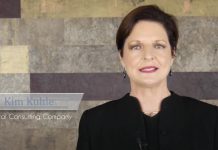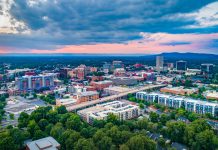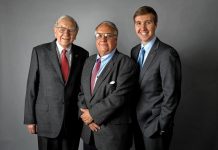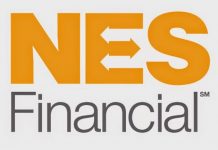Opportunity Zones provide many benefits, including federal capital gains tax advantages for investments made in these areas. Socially conscious investors are also turning their attention to opportunity zones, as QOFs offer local communities housing and supportive services for residents.
Kim Kuhle is the CEO of the Veterans Victory Opportunity Fund (VVOF), a private-equity real estate Qualified Opportunity Fund (QOF) designed as a vehicle for investors with capital gains equity.
Click the play button above to listen to our conversation with Kim.
Episode Highlights
- How the Opportunity Zone program offers tax benefits to investors making qualified investment in a Qualified Opportunity Funds (QOF).
- The power of opportunity zones to generate positive social impact alongside risk-adjusted returns.
- How to achieve the full tax benefits of opportunity zones and the specific tax incentives they provide.
- How to integrate the needs of local communities into the formation of Qualified Opportunity Zones.
- Holistic real estate developments and supportive services for veterans in Qualified Opportunity Zones.
- The types of opportunity zones capturing investors’ interest right now.
- How solar tax credits work for businesses and the benefits of these systems.
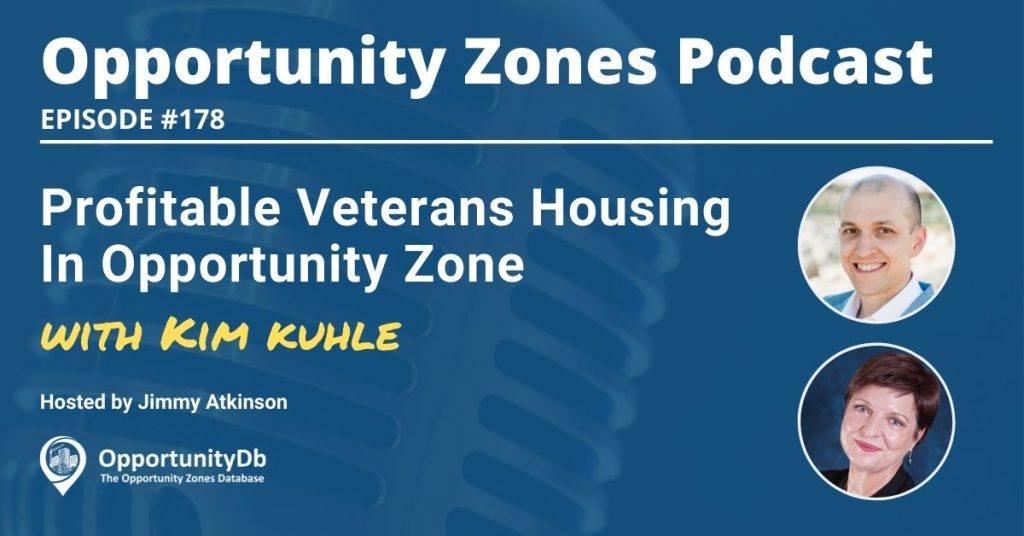
Featured On This Episode
Industry Spotlight: Veterans Victory Housing & Small Business Centers
Veterans Victory Opportunity Fund – Colorado Springs, CO (VVOF) is a private-equity real estate Qualified Opportunity Fund (QOF) designed as a vehicle for investors with capital gains equity. Funds will be used to purchase, construct and renovate a mixed-use property marketed to Veterans, resulting in ADA-accessible, green multifamily apartments, business offices and programs for Veterans that create above-market returns for the investor. VVSBC will be built in 10 other cities.
Learn More About Veterans Victory Housing & Small Business Centers
- Veterans Victory Housing & Small Business Centers
- Veterans Victory Housing & Small Business Centers on Facebook
About The Opportunity Zones Podcast
Hosted by OpportunityDb.com founder Jimmy Atkinson, The Opportunity Zones Podcast features guest interviews from fund managers, advisors, policymakers, tax professionals, and other foremost experts in opportunity zones.
Show Transcript
Jimmy: Welcome to The Opportunity Zones podcast. I’m your host, Jimmy Atkinson. Joining me today is Kim Kuhle, CEO of Veterans Victory Housing and Small Business Centers. She has an opportunity zone fund, which focuses on developing communities for veterans in opportunity zones, and she joins us today from Omaha, Nebraska. Kim, welcome to the show.
Advertisement
Kim: Thank you.
Jimmy: Great to be with you here today, Kim. Really excited to dive into this topic and the services that you’re providing to our nation’s veterans. So to start us off, could you tell me and our listeners, what exactly is it that you’re doing? Tell us a little bit more about Veterans Victory Housing.
Kim: Yes, I’d love to. Veterans Victory Opportunity Fund is basically private equity real estate, and it’s located in Opportunity Zones. Our first one is Colorado Springs. It’s a vehicle for investors who care about veterans and want to invest in the programs we’re offering. So we basically have a mixed-use project, single-asset project in Colorado Springs. Our first one is 15 acres. It’s at the top of the hill. We have 15 small business offices and 240 apartments on a gorgeous campus together with programs, and we’ll get into that a little bit later.
Jimmy: Yeah, I’ll ask you about the programs in a minute here, but first, I wanna learn more about why you started this, Kim. Give us a little bit more of your backstory and how you got involved.
Kim: Sure, I’d love to. I was born on an air force base and my family moved around a lot to different air force bases while my dad was a supply lieutenant. And then, fast forward, my mother, she was part of an explosion, and my father went to visit her at the hospital and he had a heart attack while seeing her in the burn ward. So then we learned the devastation of the impact of the terrible post-traumatic stress disorder that comes from a traumatic event. And then I realized that I had the skills to build an opportunity zones fund, and I cared passionately about veterans. So my particular mixed-use housing and small business opportunity features some healthy living programs, and it provides support for entrepreneurs.
My mother went on to be an award-winning real estate broker, and she went all over the world helping victims of crime. So I’m one of the first individuals to say that people who have post-traumatic stress disorder through wartime events can go on to run excellent businesses. So that’s my mission, and I’m really excited that opportunity zones programs came about because I’m able to show my financial prowess and I can provide 20% to 26.8% internal rate of return for the investors.
Jimmy: And a lot of that return is derived from the system of revenue production that you’ve developed under what you refer to as the five main programs of this concept. And the five programs I’m just looking at your slide deck now, Kim, you identify as, one, the Digital Connection Program, two, the Veteran-Owned Small Business Development Program, three is the Holistic Healthy Housing Program, four, the Innovative Business Investment and Risk Reduction Program, and five, the Carbon Footprint Reduction Program, where you’re taking advantage of some solar and other types of energy-efficient materials. Could you go through each of those programs one by one, tell us a little bit more about each one and how they’re helping the overall program that you’re developing?
Kim: Yes. First of all, we’re working with AdvantEdge Technology that’s owned by GTSD Global and it has 20 patents. So our Digital Connection Program is helping us in several ways. We’re running our utility management system and the solar system through the technology. Plus, we’re providing a database for our veteran entrepreneurs to find each other and buy and sell among veterans through the database. We’re also providing higher, faster broadband technology through this technology. And we’re also providing the street lighting and the security monitoring systems for our real estate.
Advertisement
So my husband works in a factory and really I’m using factory principles. All factories run on two or three shifts. At my entrepreneurial campus, Veterans Victory Housing and Small Business Center Campus, I’m basically running money-making programs on the same site, but the rental income is enough to pay the investors handsomely. It’s just that we have more programs that bring in more money. So the Veteran-Owned Small Business Development Program is another one of those money makers, and that’s where the veterans pay rent and they get access to the state of the art database and the technology and the quick broadband. Plus, the veterans are in a community, they’re supporting one another, encouraging each other to land those veteran preference military and construction contracts. And as we know through the National Build Back Better Program, there are more contracts with the government available than ever before. Veterans get a preference on every one of the contract bids.
Next, we have Holistic Healthy Housing, and that’s where we’re totally ADA-accessible. We already have 40 units rented because we’re providing supportive, permanent housing to some veterans. And we have really fun programs, we have an art center, we have yoga, all the classic gymnastics programs, plus we have a physical therapy program that brings us money. And then next, we have the Innovative Risk Reduction Program. That’s a partnership with banks, where we help the bank, including my very own bank, TBK Bank, get community reinvestment at credit for the loans and the investments that they make as well as the small business seminars that they provide on-site. We think that we’ll probably have a bank branch at each one of our Veteran Victory Housing and Small Business Centers.
And then finally, we have my most favorite part and that is renewable energy. We are using the roof and the canopies over the parking stalls to collect the energy from the sun. And our architects designed our building so that we could have maximum collection. And that’s really exciting because the opportunity zone program gives us an extra financial incentive for providing renewable energy services. So we just can’t be more excited about all the money-making aspects of Veterans Victory that help everything work together very beautifully for the investor.
Jimmy: Yeah, it’s remarkable, the scope of what this project is trying to accomplish here, a very impressive list of those five programs there. Tell us a little bit more about the opportunity zone fund itself. And I’m also curious, is it a single-asset fund that’s only investing in this initial Colorado Springs development, or is it a multi-asset fund? Because I know you have more projects coming down the pipeline and we’ll discuss that a little bit later in the episode. And then, how much are you still looking to raise, and is it still open to investors? Tell us everything you can about the fund, if you don’t mind, Kim.
Kim: Yes. Well, my attorneys are brilliant. They developed the single-asset funds and the idea is to have one of these in each of the target cities that we’re working in. And then that allows the local investors to get really excited about the project. And it’s working very beautifully already because the owners of the land that I purchased the first 15 acres from became our key advocate, and they’re working in the entire veteran community in Colorado Springs to tell the great story that we have. And also, the original landowners say, “Hey, this is one of the better deals. It doesn’t matter that it’s in an opportunity zone. The rate of return is outrageously high in comparison to other real estate.”
So, yes, we have a single-asset fund, but then we also have this other fund and it’s a $15 million impact fund. So there could be a large investor out there that wants to invest in several locations and maybe that investor just wants to invest in 30% of the equity that’s needed, and that’s fine, we can take that $15 million impact fund investor and include him or her in each one of our single-asset funds in the other cities. So we think we just have the excellent combination where we can attract investors that want the really high dollars and they also want to have their name attached to a social impact program. We also have the ability to take $10,000 in investment from the neighbor.
We have one board member and neighbor and volunteer, and he’s a provost marshal from the army. He’s so excited. He wants to take his tractor up to the top of our hill at our location, and he wants to help the engineers and the builders actually build Veterans Victory. He’s probably going to come in at $25,000, and we love him just as much as we will love the $20 million investor. Now, what we need right this minute is another $18 million to close out Veterans Victory Colorado Spring, and they need the investment desperately because the city needs 25,000 units of housing today. And the city is growing 1.6% every year, so we already have a waiting list, and we’re working on that waiting list and we expect to be totally rented up before we even open our doors.
Jimmy: Well, that’s incredible. Kim, I love this concept for a lot of reasons. One, its social mission and helping our nation’s veterans is incredible and very much needed in this country. And not only that, but it’s also profitable through those five programs. And not only that, but it’s also an opportunity zone fund, so there’s these amazing tax incentives. But speaking of tax incentives, the opportunity zone fund is not the only tax incentive program that you’re taking advantage of here that is benefiting your investors in the long run, but I know you are also stacking a lot more state and local tax incentives and some additional federal tax incentives. You have some solar tax credits, I would imagine, or some sort of PACE financing that you’re able to take advantage of. Can you tell us a little bit more about all of the different types of incentive programs that this fund is taking advantage of?
Kim: Yes. Well, it’s really exciting because we do have the potential of getting the PACE funding. And what that means is that I can combine a bigger package of the AdvantEdge Technology and the HVAC systems, the silver lighting systems, anything that has moving parts. I can combine everything and get more PACE financing, which is a long-term financing program. And I can buy more beautiful things for our veterans, and at the same time, make sure that I have maximum value for the 10-year buyout of the investors at 10 years and one day.
So my whole concept is about using the time value of money so that I can make sure that my investors have a great return when they walk out with their appreciation, their dividends, their rental income, all capital gains tax-free in 10 years. So it’s really exciting. I’m working with banks to get the new market tax credit investments for the small business side, and respecting the number of people that are using low-income housing tax credits. And I’m actually avoiding using those because so many other people depend upon them, and I’m purposely trying to create a new model where I can prove that the opportunity zone investment program is a success and it is right for growing distressed communities.
A number of people debated against opportunity zone legislation because they said rich people will just get richer on it, but I can prove that there are many wealthy investors that want to do a great job. And just look at the impact, 315 new jobs at the Colorado Springs location, 240 new homes, 150 new veteran-owned businesses creating 600 jobs, 67 million in green construction. And yes, I’m working with the State of Colorado. They have the most advanced incentive program for solar technology. I’m pretty sure that we’ll get a very fine, handsome enhancement for our solar technology. Plus, we’re sitting in an enterprise zone. You name it, I’m going after any incentive that I can because I’ll be able to provide more for my investors and more for my veterans with the total brilliant package of various incentives.
Jimmy: Yeah, and that’s what it’s all about. You’re doing a terrific job there, Kim, it sounds like. And so you’re well underway right now with this initial development in Colorado Springs, but you do not want that to be the full story. You are targeting several other markets and projects, and you’ve got several in the pipeline, including South Sioux City, Grand Junction, Jacksonville. I know there’s several other cities. Can you tell us a little bit more about the target markets that you’d like to go after and some of the other projects that are in your pipeline?
Kim: Yes, I’m going after high-growing communities that have the potential for a rapid improvement. Basically, we know that every $10 million of investment creates 45 jobs. And if we’re going into some real distressed areas, then we can make a huge impact more quickly. And all throughout San Benito, we’re so excited because we’re able to build 360 apartment units in San Benito for first responders, border patrol, and veterans. Plus, we’re doing the entrepreneurship offices and retail space and that’s at RVG Epicenter. So we’re marrying the advanced technology with that and doing our whole program there.
Now, in South Sioux City, we’ve got a very unique opportunity. We’re partnering with community collaborative, and that means our Veterans Victory will own for-profit offices, and we already have them free rented by the nonprofit community. Twenty nonprofits are in this collaborative, and they want to do a rent-to-own program. So our Veterans Victory will help these new nonprofits grow up to be landowners, office owners within 10 years. We’re in Sioux Falls. We’re going to do a single-family housing program in Sioux Falls with veterans’ preference. We’re in Omaha and we’re doing the same project. We’ve got a targeted space within one mile of 40 veteran programs. We’re near Sac, of course.
In Jacksonville, it’s very exciting. We’re going to do some work with the navy, and we have a place picked out that is just about one mile away from the stadium there in Jacksonville. In Tucson, we’ve got a place picked out that’s just a rocks throw away from the hospital. So each community will represent a different type of partnership and a different specialty, and we totally anticipate that we will be able to buy our materials for the Veterans Victory at a discount because we’re going in at a quantity situation. And we also anticipate that our clients, our veterans, our business people will interact with each other and introduce something that’s even better as a community of Veteran Victories than we could provide individually.
Jimmy: Well, it’s an amazing concept, incredible investment product that you have here, Kim, and it’s been a pleasure speaking with you about today. And I hope our listeners learned a lot and they get in touch with you if they wanna learn more. Where can our listeners go to learn more about you and Veterans Victory?
Kim: Well, we just use the simple website title and it’s just the usual www.vvsbc. So it stands for Veterans Victory Small Business Centers. And I do have the call to action. I’m asking everyone to tell other people about the veteran preference for military contracts, all kinds of government contracts. I’m also asking everyone promote veterans as they seek their jobs and start their businesses. And then we do need equity, investment dollars, and capital gains investment dollars. We even have a nonprofit where we’re helping veterans when they need extra items such as wheelchairs, or prosthetic arms, or you name it. Whatever the veteran needs, our nonprofit will try to provide that.
Jimmy: Terrific. Well, I appreciate it there, Kim. And that URL again was vvsbc.com stands for Veterans Victory Small Business Centers, vvsbc.com, to learn more about the Veterans Victory Housing and Small Business Centers and the Veterans Victory Opportunity Zone Fund which Kim manages. And Kim, I wish you nothing but the best of luck in the future. I’m curious to see where you can take this over the next several months and years. For our listeners out there today, as always, I will have show notes for today’s episode on the Opportunity Zones Database website. You can find those show notes at opportunitydb.com/podcast, and there you’ll find links to all of the resources that Kim and I discussed on today’s show. Kim, again, it’s been a pleasure. I appreciate you spending some time with us and coming on and telling us more about Veterans Victory Housing and Small Business Centers. Thanks, again.
Kim: Thank you, Jimmy. Take care.







